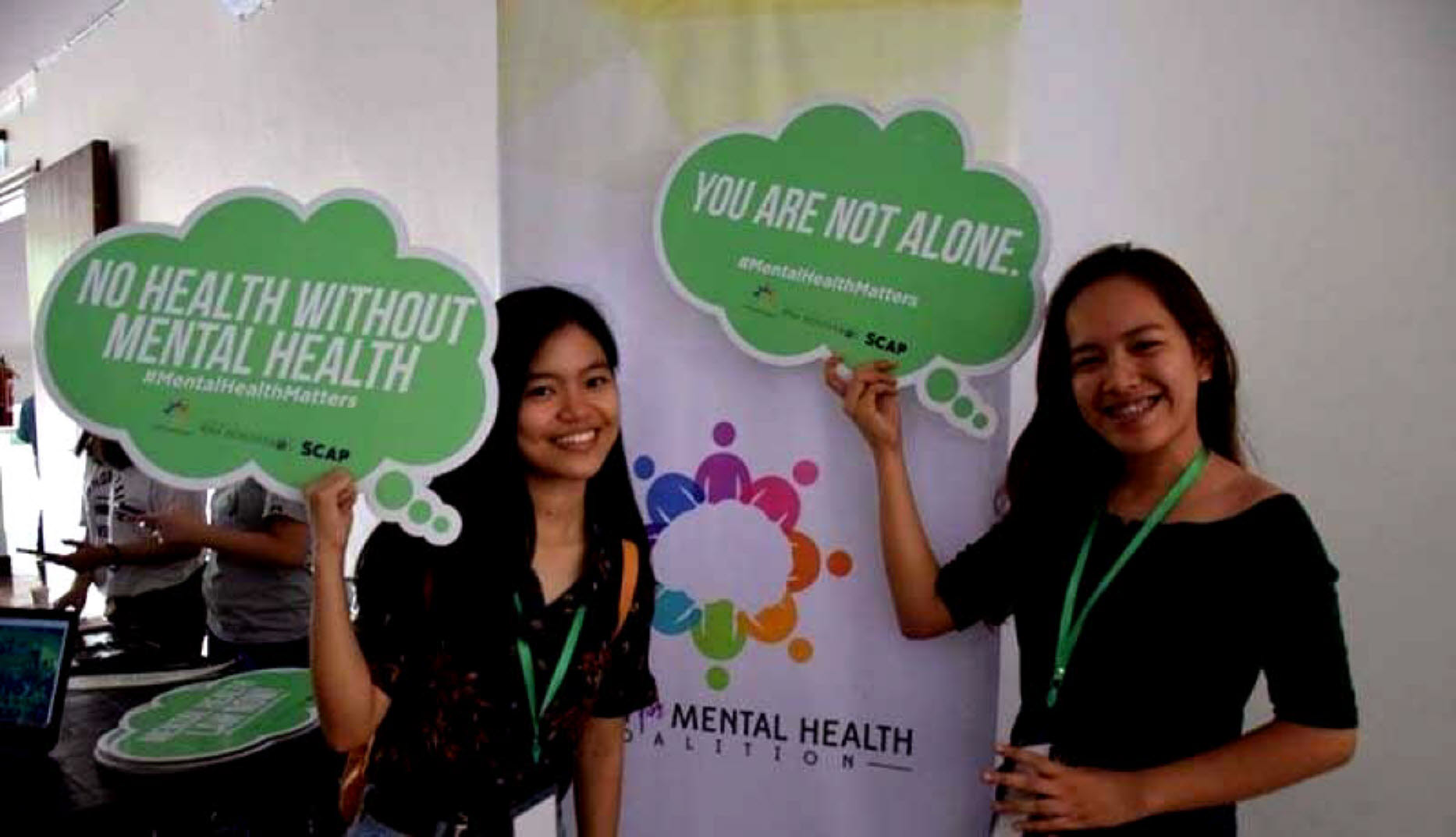Despite an improvement in #mentalhealth awareness in recent years, there is still a long way to go to end the #stigma of #suicide. This #WorldMentalHealthDay we explore why that is and what can be done

Trigger warning: mentions of #suicide throughout
There are certain things that go right through you. Chalk on a blackboard. Cutlery scraping over a dinner plate. Freezing cold ice cream on sensitive teeth. The word ‘#suicide’ has the same effect. Its uncomfortable nature means that it’s often avoided or left unspoken. Whether subconsciously or not, anything that has prompted feelings of discomfort, we tend to avoid repeating. #Suicide still feels like a subject we can’t openly discuss, even though that very discussion is vital for prevention.
To say we are in the midst of a #mentalhealthcrisis would be an understatement. The impact of the #Covid-19 #pandemic has been insidious and far-reaching – from the global grief to the health #anxiety to the #loneliness caused by social restrictions – and many of us have been left struggling. Official statistics report that 1 in 6 adults experienced some form of #depression this summer. Given these worrying statistics, having those difficult, uncomfortable conversations has never been more important.
1 in 6 adults experienced some form of #depression this summer
#Suicide, mostly, holds connotations of selfishness; that it is an unforgiving act we can never understand. Before my dad died by #suicide seven years ago, I’d have been lying if I said I didn’t think that too. I was only 18 when it happened and my knowledge of the complexities of #mentalhealth was limited to say the least. I was consumed by anger and confusion. I knew that he suffered from #depression, but I didn’t understand what that word actually meant. I didn’t know that the ‘happiest’ people in the world could be depressed, or that the people with ‘everything’ could want to end it all. I’d only really seen #mentalillness and #suicide depicted in films or on TV and never thought it would be something that rewrote my whole life.
#RobinWilliams died from #suicide a month after Dad. Suddenly, despite my recent personal experience, I started to understand it a little bit more; a man that seemingly had everything was still being shadowed by the black dog. Unlike a physical injury, such as a broken arm or cracked tooth – things you wouldn’t hesitate getting treatment for – #mentalhealth remains unseen and misunderstood.
Since my dad’s death in 2014, the conversation surrounding #mentalhealth and #suicide has improved. The tragic, high-profile death of Caroline Flack prompted an entire #BeKind movement, while the Duchess of Sussex opening up about her suicidal thoughts made headlines the world over. Popular recent books or TV shows such as Sally Rooney’s Normal People have tackled the subject with sensitivity. Yet with these conversations there remains a #stigma that’s more damaging than just opinion.
The #stigma of #suicide
When talking about someone taking their own life, there’s a heavy element of shame attached. “There’s still so much #stigma,” says Sophie, a branch director at Samaritans. “A lot of people who are living with a #mentalhealthcondition won’t want to get the help they need because they’re worried it will make them look weak.”
“#Suicide is sometimes considered selfish or attention-seeking, but it’s not like that at all,” she adds. “Often, people who do act on suicidal thoughts think they’re helping those close to them. Lots of people who are suicidal don’t want to die, they just can’t see any way through. If you can help lighten that load through talking, it really can save lives.”
I’m not alone in having these misconceptions before my own loss. Emily, a 24-year-old Samaritans volunteer, tells me how she too felt the same before her uncle died from #suicide in 2019. “You never expect that it will happen to your family,” she says. “My uncle was a successful businessman and a great father who had a family that loved him so much; it just all got too much for him. #Mentalhealth doesn’t discriminate. Anyone and everyone should be listened to.”
Unlike a physical injury, such as a broken arm or cracked tooth, #mentalhealth remains unseen
She continues: “Another misconception is that people who do talk about #suicide aren’t serious – that they won’t go through with it and that it’s a cry for help or attention. People who have died by #suicide have often told people close to them that they feel their life is not worth living or that they have no future. This misconception prevents them from getting the help they need.”
Talking about #suicide
It’s undeniable that #suicide is a difficult topic to discuss – perhaps the most difficult topic of all – whether you’re experiencing suicidal thoughts, know someone who is, or know someone who has lost a loved one.
Chartered #psychologist and author of The Leader’s Guide to Resilience, Dr Audrey Tang, explains that death itself is a topic which can “trigger negative emotions in others”.
“As such, especially for fleeting conversations, or in social situations, it is not one we would tend to raise,” she tells me. “The less we talk about something, the less we really have time to truly consider our thoughts on the topic, or even practice having the conversation, and consequently, the more awkward it can feel. It is also, arguably, quite practical not to discuss a topic where you do not know what response you will elicit.”
#Suicide, of course, is death combined with with the equally discomfort-inducing topic of ill #mentalhealth, making it even harder to discuss.
“Despite #celebrities and elite #athletes speaking up about their #mental ill health, and awareness campaigns and popular culture addressing #suicide and bringing the #mentalhealth conversation to the fore, we still don’t feel comfortable talking about our #mental wellbeing with friends and family,” adds Dr Tang.
“There might be practical reasons for this. Some people have a tendency to be dismissive when we open up, even if it comes from a place of love, with phrases like, ‘Oh you’re fine’ or, ‘You’ve got all this going for you’. It’s difficult enough to admit when we feel weak, as we don’t want to be a burden, we might be embarrassed, or we might feel the need to be strong for others. If when we do raise these feelings and someone invalidates our right to feel bad, this can make speaking up again even harder.”
Sophie adds that asking questions, rather than making statements or pointing out positives, can be helpful. “Although you might think you’re being encouraging with things like, ‘You’ve got all this going for you’, it’s important to really listen to the other person. Try asking questions such as, ‘I’m sorry to hear you feel that way, what makes you feel like that?’ to get them talking.
Ending the shame around #suicide is one of the biggest steps we can take to towards prevention. Stripping back those misconceptions and giving someone space to vocalise their feelings without dismissing them, will let those struggling feel more able to talk.
“I think if people felt more able to talk about their feelings openly, they would ask for support sooner,” agrees Emily. “I’m sure many people suffer in silence until they feel they no longer can. One of the biggest problems is fear of being judged or not listened to.”
Another common fallacy is that mentioning suicide might ‘put the idea in someone’s head’, or somehow encourage the act. Studies suggest the opposite is true. “Evidence shows that talking to someone about #suicide can protect them, make them feel listened to and help them feel less trapped,” says Emily. “It helps make their feelings validated and lets them know someone cares about them. Reaching out could save a life.”
Sophie agrees that “normalising the conversation would be a big step. #Suicide is a huge issue which affects a lot of people; we shouldn’t feel awkward about discussing it.”
The power of language
Our words and actions have more power than we think. Regardless of anyone’s current state of #mentalhealth, showing kindness or taking the time to listen can change someone’s mood and day completely – whether in-person or virtually. But, considering impact of your words before speaking or sharing online, is vital.
“If you’re posting or commenting about #suicide on #socialmedia, it’s important to consider that people reading may have their own experience or are bereaved by #suicide,” says Sophie. “Trigger warnings are an important and useful way to give people notice.”

#JamesDonaldson notes:
Welcome to the “next chapter” of my life… being a voice and an advocate for #mentalhealthawarenessandsuicideprevention, especially pertaining to our younger generation of students and student-athletes.
Getting men to speak up and reach out for help and assistance is one of my passions. Us men need to not suffer in silence or drown our sorrows in alcohol, hang out at bars and strip joints, or get involved with drug use.
Having gone through a recent bout of #depression and #suicidalthoughts myself, I realize now, that I can make a huge difference in the lives of so many by sharing my story, and by sharing various resources I come across as I work in this space. #http://bit.ly/JamesMentalHealthArticle
ERIK MADIGAN HECK
Dr Tang also recommends thinking carefully about the language you’re using. “Being open and direct is recommended when it comes to talking about #suicide,” she suggests. “There’s a preference to remove the word ‘commit’ and use the phrase ‘death by #suicide’ instead.” Using the word ‘commit’ implies negative connotations, associating the act with a criminal one. Similarly, referring to a “failed attempt” at #suicide is considered stigmatising and inappropriate – implying that they are ‘successful’ if their actions result in death. Instead, it is recommended to refer to a “non-fatal attempt at #suicide”.
Think carefully about the language you’re using
Reflecting back on someone’s language is also a useful tool. If someone says “I can’t cope”, then try gently asking them, “What does ‘not coping’ mean?” It can help them to process what they’re feeling.
Coping with feelings of guilt
Being bereaved by #suicide is described by the NHS as “grief with the volume turned up”.
While it’s of course important to highlight ways to encourage openness, it’s also vital to understand that there is no absolute prevention for actions taken as a result of an illness. Those who have experienced bereavement by #suicide will commonly feel sensations of guilt and of failing someone.
I personally have lost count of the number of sleepless nights I’ve spent wishing I did more or helplessly quizzing myself on the signs I might have missed. I may never fully understand, but I found comfort when I accepted that there was nothing I alone could have done.
Julia Samuel, psychotherapist and MBE, offers some comfort on this guilt: “The painful truth is that death by #suicide is extremely complex and inevitably leads the survivors to have a revolving wheel of ‘What if…’ and ‘Could I have…’ thoughts that can torment them.
“Those questions, the anger, and the guilt are profoundly painful. We can’t stop people from having those feelings, but I suggest that you don’t conflate the feeling with the fact. Just because you feel guilty doesn’t mean that you are.”
Samuel suggests a coping strategy that involves acknowledging contradictory thoughts. “Hold an image of what your heart says – for example ‘it was my fault’ – and an image of what your mind tells you – for example, ‘this wasn’t in my control’. Hold both images next to each other. It can be calming to recognise that although you are holding contradictory thoughts, they are both valid – even if the former isn’t true.”
As for me, all I can do now is keep talking, keep having those difficult conversations, and remind people that they are not alone. Over the past two years, we’ve had to work and support each other like never before. Let’s not stop now.
SAMARITANS ARE HERE TO HELP
Samaritans are here to listen, 24/7. You can call us on 116 123, email us at jo@samaritans.org or write us a letter. You don’t have to feel suicidal to get in touch. Only 1 person in 5 who calls Samaritans says that they feel suicidal. For more information and resources to help you, or those you love, visit samaritans.org
WHAT TO DO IF YOU’RE STRUGGLING OR EXPERIENCING SUICIDAL THOUGHTS
Struggling to cope with everyday life is a common feeling and doesn’t look or feel the same for everyone. It’s hard to generalise about how it’ll make you feel or act, but some signs to look out for include:
- Lacking energy or feeling tired
- Feeling exhausted all the time
- Experiencing ‘brain fog’, or finding it hard to think clearly
- Finding it hard to concentrate
- Feeling restless and agitated
- Feeling tearful, or wanting to cry all the time
- Not wanting to talk to or be with people
- Not wanting to do things you usually enjoy
- Using #alcohol or drugs to cope with feelings
- Finding it hard to cope with everyday things and tasks
- Experiencing ‘burn out’
PRACTICAL WAYS TO HELP YOURSELF
It’s important to remember that it’s okay to feel down, lonely, or isolated. You’re not alone in feeling like this; many people struggle to cope at one point or another. Talking about how you’re feeling can help put things into perspective and help you to feel more positive about the future.
Some things you can do to help yourself are:
- Make time for yourself, relax, and do things you enjoy
- Eat healthily; get plenty of sleep and exercise
- Spend time with people you love
- Talk about your problems with people you trust
- Be proud of what you’re good at, as well as aware of what you struggle with
- Pay attention to what you’re feeling.

James Donaldson is a Washington State University graduate (’79). After an outstanding basketball career with WSU, he went on to play professional basketball in the NBA with the Seattle Supersonics, San Diego/L.A. Clippers, Dallas Mavericks, New York Knicks, and Utah Jazz. He also played for several teams in the European Leagues in Spain, Italy, and Greece, and he toured with The Harlem Globetrotters to wrap up his career. James was an NBA All-Star in 1988 while playing center for the Dallas Mavericks. In 2006, James was inducted into the Pac-10 Sports Hall of Fame and also the Washington State University Athletic Hall of Fame. In 2010, James was elected as a board member for the NBA Retired Players Association.
James frequently conducts speaking engagements (motivational, inspirational, educational) for organizations, schools, and youth groups.
In 2010, James was the recipient of the NBA Legends of Basketball ABC Award, awarded for outstanding contributions in Athletics–Business–Community.
He believes in being a role model for success and professionalism to the scores of young people to whom he devotes so much of his time. He currently serves on several boards and committees and is a member of many organizations.
James believes in developing relationships that create a “Win-Win” environment for everyone involved, and in being the best he can be!
For more information about James Donaldson or to request he speak at your event, contact him at:
www.StandingAboveTheCrowd.com
JamesD@StandingAboveTheCrowd.com
1-800-745-3161 (voicemail & fax)
James Donaldson is the author of “Standing Above The Crowd” and “Celebrating Your Gift of Life” and founder of the Your Gift of Life Foundation which focuses on mental health awareness and suicide prevention, especially pertaining to our school aged children and men.
If you’re interested in having James come and speak to your group of young adults, business entrepreneurs, aspiring political and community leaders, and athletic teams, please contact him at jamesd@yourgiftoflife.org and or leave a personal message for him at 1-800-745-3161. Keep up with him and read about how he is reaching out and making a difference in the lives of so many around the world at www.yourgiftoflife.org



